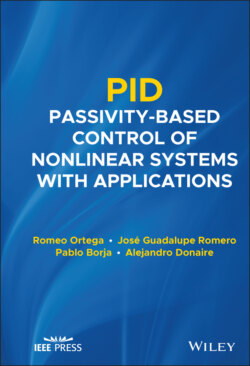Читать книгу PID Passivity-Based Control of Nonlinear Systems with Applications - Romeo Ortega - Страница 2
Table of Contents
Оглавление1 Cover
2 Series Page
3 Title Page
4 Copyright
5 Dedication
6 Author Biographies
7 Preface Bibliography
8 Acknowledgments
9 Acronyms
10 Notation
11 1 Introduction
12 2 Motivation and Basic Construction of PID Passivity‐Based Control 2.1 ‐Stability and Output Regulation to Zero 2.2 Well‐Posedness Conditions 2.3 PID‐PBC and the Dissipation Obstacle 2.4 PI‐PBC with and Control by Interconnection Bibliography Notes
13 3 Use of Passivity for Analysis and Tuning of PIDs: Two Practical Examples 3.1 Tuning of the PI Gains for Control of Induction Motors 3.2 PI‐PBC of a Fuel Cell System Bibliography Notes
14 4 PID‐PBC for Nonzero Regulated Output Reference 4.1 PI‐PBC for Global Tracking 4.2 Conditions for Shifted Passivity of General Nonlinear Systems 4.3 Conditions for Shifted Passivity of Port‐Hamiltonian Systems 4.4 PI‐PBC of Power Converters 4.5 PI‐PBC of HVDC Power Systems 4.6 PI‐PBC of Wind Energy Systems 4.7 Shifted Passivity of PI‐Controlled Permanent Magnet Synchronous Motors Bibliography Notes
15 5 Parameterization of All Passive Outputs for Port‐Hamiltonian Systems 5.1 Parameterization of All Passive Outputs 5.2 Some Particular Cases 5.3 Two Additional Remarks 5.4 Examples Bibliography Note
16 6 Lyapunov Stabilization of Port‐Hamiltonian Systems 6.1 Generation of Lyapunov Functions 6.2 Explicit Solution of the PDE 6.3 Derivative Action on Relative Degree Zero Outputs 6.4 Examples Bibliography Notes
17 7 Underactuated Mechanical Systems 7.1 Historical Review and Chapter Contents 7.2 Shaping the Energy with a PID 7.3 PID‐PBC of Port‐Hamiltonian Systems 7.4 PID‐PBC of Euler‐Lagrange Systems 7.5 Extensions 7.6 Examples 7.7 PID‐PBC of Constrained Euler–Lagrange Systems Bibliography Notes
18 8 Disturbance Rejection in Port‐Hamiltonian Systems 8.1 Some Remarks on Notation and Assignable Equilibria 8.2 Integral Action on the Passive Output 8.3 Solution Using Coordinate Changes 8.4 Solution Using Nonseparable Energy Functions 8.5 Robust Integral Action for Fully Actuated Mechanical Systems 8.6 Robust Integral Action for Underactuated Mechanical Systems 8.7 A New Robust Integral Action for Underactuated Mechanical Systems 8.8 Examples Bibliography Notes
19 Appendix A Passivity and Stability Theory for State‐Space Systems A.1 Characterization of Passive Systems A.2 Passivity Theorem A.3 Lyapunov Stability of Passive Systems Bibliography Note
20 Appendix B Two Stability Results and Assignable Equilibria B.1 Two Stability Results B.2 Assignable Equilibria Bibliography
21 Appendix C Some Differential Geometric Results C.1 Invariant Manifolds C.2 Gradient Vector Fields C.3 A Technical Lemma Bibliography
22 Appendix D Port–Hamiltonian Systems D.1 Definition of Port‐Hamiltonian Systems and Passivity Property D.2 Physical Examples D.3 Euler–Lagrange Models D.4 Port‐Hamiltonian Representation of GAS Systems Bibliography
23 Index
24 End User License Agreement
